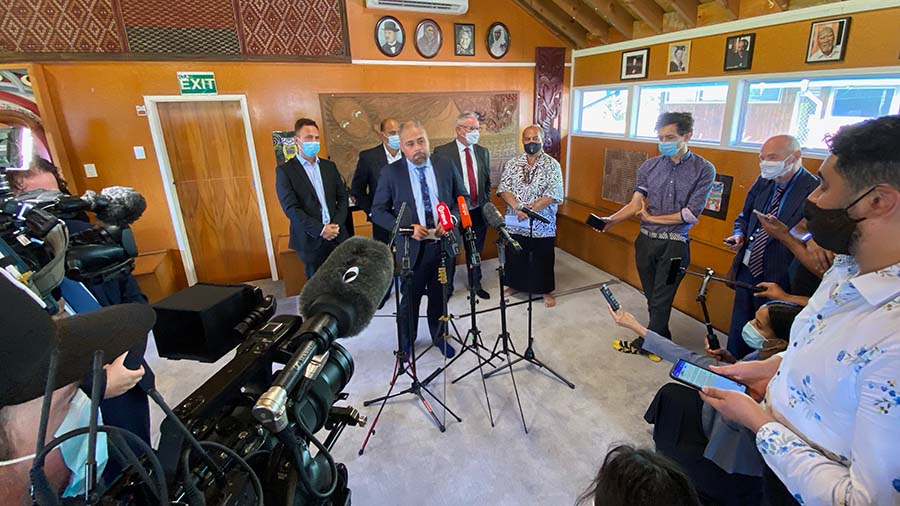Extra support for Māori and Pacific Omicron response
Extra support for Māori and Pacific Omicron response

(Picture caption: Extra assistance is being provided to Māori and Pacific communities as they continue to deal with the effects of the current Omicron outbreak. Photo credit: Tagata Pasifika.)
Extra support is being made available to Māori and Pacific communities as they continue to face the impact of the current Omicron outbreak.
This is in addition to the Care in the Community boost the Government recently announced, which will help all families who need to self-isolate as well as the social service organisations and community providers working hard to support them.
Using $140 million funding, 160 Māori and Pacific health providers will together support Māori and Pacific households throughout Aotearoa.
Of the total funding, $18 million has been designated for the Pacific Aotearoa Community Outreach Initiative, led by the Ministry for Pacific Peoples (MPP), to support Pacific communities to prepare, respond and recover from the social and health impacts from Omicron.
This investment will help Pacific health providers, particularly those outside the northern region, scale up the services they already provide to Pacific communities, says Minister for Pacific Peoples and Associate Minister of Health Hon Aupito William Sio.
“Funding will go towards supporting their workforce resources including vaccination,” Minister Sio says.
“I want to encourage innovative Pacific models of care with a focus on the immediate Omicron response, and I want to communicate key public health messages in culturally appropriate ways.”
He adds the Pacific Aotearoa Communities Outreach initiative prioritises key programmes that have proven successful in Pacific communities.
“This investment is innovative, comprehensive, and Pacific-focused, allowing Pacific Peoples to prepare for the next phase of COVID-19 and to respond and rebuild in the aftermath of Omicron,” he says.
Minister for Whanau Ora and Associate Minister of Health Hon Peeni Henare says Omicron is likely to disproportionately affect Māori and Pasifika communities and the Government is committed to making sure vulnerable whanau received the support and care they deserve.
“With Omicron cases increasing it is important whānau have the support they need to self-isolate and stop the spread of the virus,” Minister Henare says.
“We know our funding to date has made a huge difference in lifting vaccination rates and reducing the vulnerability of whānau, but the fight is not over yet and Omicron presents a whole raft of new challenges,” he says.
“The focus of this current response is to enable Māori health providers to scale up their efforts, to support the Whānau Ora Commissioning Agencies to directly get resources to the people most in need, and for the Māori Communities COVID Fund to support community agencies in complementary ways.
“We have seen how the rapid response by our Māori health and community providers works fast and effectively and their models of care have been crucial in the Government’s COVID-19 response for their own communities.”
Minister for Māori Development Hon Willie Jackson says Māori providers have shown their strength and agility when dealing with previous outbreaks.
“This investment will enable them to deliver immediate, flexible, holistic support where it is needed most,” Minister Jackson says.
“We saw that in action when Māori vaccination rates increased from 69 percent to 90 percent for first dose in just 3.5 months.
“The Māori Communities COVID-19 Fund going directly to Māori providers, including iwi, supported this acceleration.”
Minister for Māori Crown Relations Hon Kelvin Davis says since the COVID-19 outbreak the Government has acted to ensure New Zealanders are supported to respond to the threats on our people and economy.
“A key strategy for accelerating vaccinations has been to support the aunties, uncles and community leaders who are known, trusted, and listened to within their communities.
“We need to continue approaches that best look after our people, so they are prepared in the face of Omicron,” he adds.
The four funding pathways that make up the $140 million are:
- Almost $40 million to Māori and Pacific health providers to enable them to scale up their services.
- $40.6 million to Whānau Ora Commissioning Agencies to enable wraparound and holistic support for whānau to ensure they have a plan for Omicron, can get tested and know how to access Care in the Community support if needed.
- $40.05 million to build on the Māori Communities COVID-19 Fund(MCCF), administered by Te Puni Kōkiri with Te Arawhiti, to enable communities (particularly iwi) to mobilise their own approaches and build resilience. Plus $1.75 million for the Karawhiua Māori vaccination campaign informing Māori communities about COVID-19, launched by Te Puni Kōkiri, and supported by the Ministry of Health and the Department of the Prime Minister and Cabinet
- $18 million funding for Pacific Aotearoa Community OutreachInitiative (PACO), led by the Ministry for Pacific Peoples, to support Pacific communities to prepare, respond and recover from the social and health impacts from Omicron.
